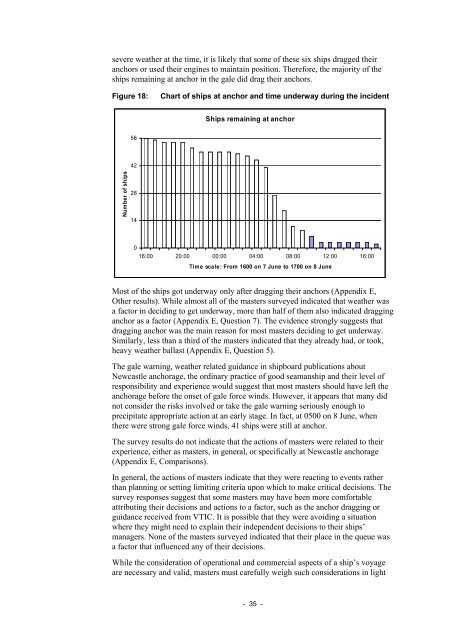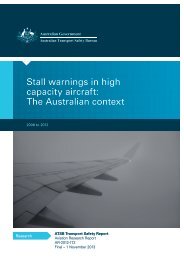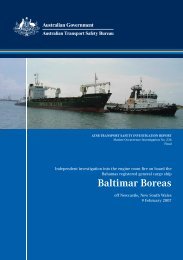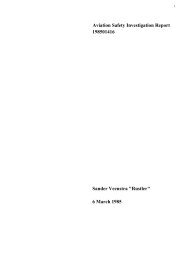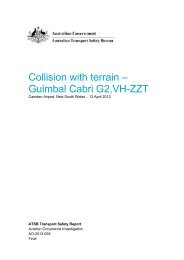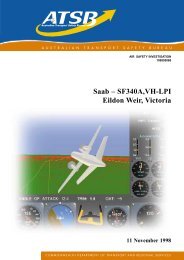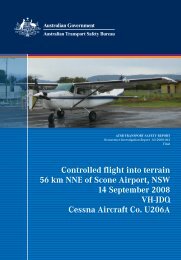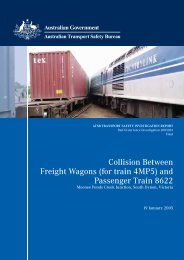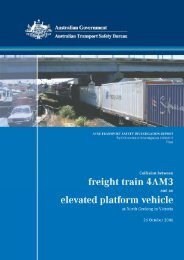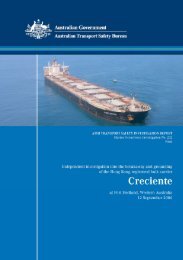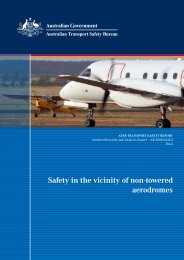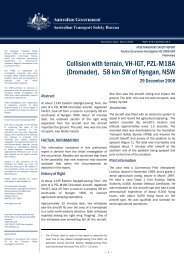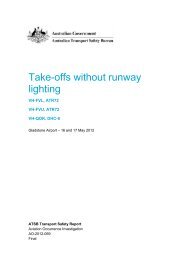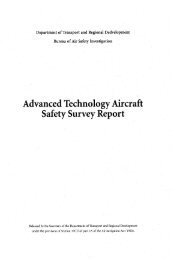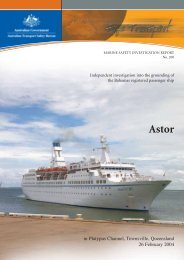Pasha Bulker 243 - Independent investigation into the grounding of ...
Pasha Bulker 243 - Independent investigation into the grounding of ...
Pasha Bulker 243 - Independent investigation into the grounding of ...
Create successful ePaper yourself
Turn your PDF publications into a flip-book with our unique Google optimized e-Paper software.
severe wea<strong>the</strong>r at <strong>the</strong> time, it is likely that some <strong>of</strong> <strong>the</strong>se six ships dragged <strong>the</strong>ir<br />
anchors or used <strong>the</strong>ir engines to maintain position. Therefore, <strong>the</strong> majority <strong>of</strong> <strong>the</strong><br />
ships remaining at anchor in <strong>the</strong> gale did drag <strong>the</strong>ir anchors.<br />
Figure 18:<br />
Chart <strong>of</strong> ships at anchor and time underway during <strong>the</strong> incident<br />
Ships remaining at anchor<br />
56<br />
42<br />
Number <strong>of</strong> ships<br />
28<br />
14<br />
0<br />
16:00 20:00 00:00 04:00 08:00 12:00 16:00<br />
Time scale: From 1600 on 7 June to 1700 on 8 June<br />
Most <strong>of</strong> <strong>the</strong> ships got underway only after dragging <strong>the</strong>ir anchors (Appendix E,<br />
O<strong>the</strong>r results). While almost all <strong>of</strong> <strong>the</strong> masters surveyed indicated that wea<strong>the</strong>r was<br />
a factor in deciding to get underway, more than half <strong>of</strong> <strong>the</strong>m also indicated dragging<br />
anchor as a factor (Appendix E, Question 7). The evidence strongly suggests that<br />
dragging anchor was <strong>the</strong> main reason for most masters deciding to get underway.<br />
Similarly, less than a third <strong>of</strong> <strong>the</strong> masters indicated that <strong>the</strong>y already had, or took,<br />
heavy wea<strong>the</strong>r ballast (Appendix E, Question 5).<br />
The gale warning, wea<strong>the</strong>r related guidance in shipboard publications about<br />
Newcastle anchorage, <strong>the</strong> ordinary practice <strong>of</strong> good seamanship and <strong>the</strong>ir level <strong>of</strong><br />
responsibility and experience would suggest that most masters should have left <strong>the</strong><br />
anchorage before <strong>the</strong> onset <strong>of</strong> gale force winds. However, it appears that many did<br />
not consider <strong>the</strong> risks involved or take <strong>the</strong> gale warning seriously enough to<br />
precipitate appropriate action at an early stage. In fact, at 0500 on 8 June, when<br />
<strong>the</strong>re were strong gale force winds, 41 ships were still at anchor.<br />
The survey results do not indicate that <strong>the</strong> actions <strong>of</strong> masters were related to <strong>the</strong>ir<br />
experience, ei<strong>the</strong>r as masters, in general, or specifically at Newcastle anchorage<br />
(Appendix E, Comparisons).<br />
In general, <strong>the</strong> actions <strong>of</strong> masters indicate that <strong>the</strong>y were reacting to events ra<strong>the</strong>r<br />
than planning or setting limiting criteria upon which to make critical decisions. The<br />
survey responses suggest that some masters may have been more comfortable<br />
attributing <strong>the</strong>ir decisions and actions to a factor, such as <strong>the</strong> anchor dragging or<br />
guidance received from VTIC. It is possible that <strong>the</strong>y were avoiding a situation<br />
where <strong>the</strong>y might need to explain <strong>the</strong>ir independent decisions to <strong>the</strong>ir ships’<br />
managers. None <strong>of</strong> <strong>the</strong> masters surveyed indicated that <strong>the</strong>ir place in <strong>the</strong> queue was<br />
a factor that influenced any <strong>of</strong> <strong>the</strong>ir decisions.<br />
While <strong>the</strong> consideration <strong>of</strong> operational and commercial aspects <strong>of</strong> a ship’s voyage<br />
are necessary and valid, masters must carefully weigh such considerations in light<br />
- 35 -


